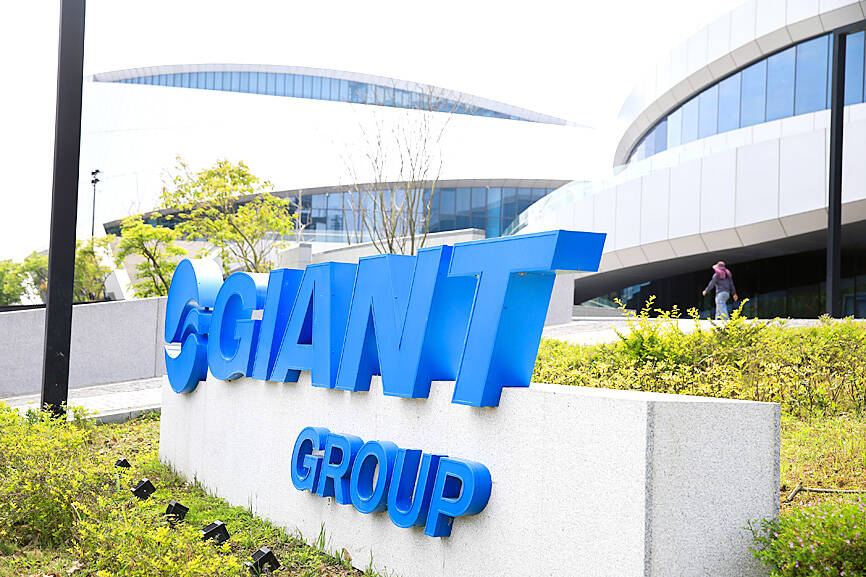Shares of Giant Manufacturing Co (巨大機械), one of the leading bicycle brands in the world, tumbled yesterday amid a sell-off sparked by reports that the company had asked its suppliers for payment postponements.
Giant shares plunged 8.04 percent to NT$206, with 5.99 million shares changing hands on the Taiwan Stock Exchange (TWSE).
The TAIEX lost 0.61 percent to close at 14,522.96 points.

Photo: Cheng I-hwa, Bloomberg
Giant’s stock faced headwinds soon after the local equity market opened as investors took cues from the bicycle giant’s financial situation. The shares continued to trade down to the end of the session, and the sell-off even spread to rival bike maker Merida Industry Co (美利達), whose shares also moved sharply lower by 6.35 percent to close at NT$177.
On Monday, Chinese-language media reported that Giant had asked its suppliers to allow it to postpone payments by 45 days from the original 120 days, citing a letter signed by Giant chief manufacturing officer Yen Ching-hsin (顏清鑫) that was sent to suppliers.
The reports said that the requests would affect suppliers that ship their products to Giant from this month to March.
The requests raised concerns over Giant’s financial condition with the global bicycle market facing weak demand, leading to inventory adjustments, dealers said.
Giant later on Monday said in a statement that the letter signed by Yen was part of a communication channel between the company and its suppliers, and it could not reveal details about its contents due to non-disclosure agreements.
It expressed regret about market speculation caused by the letter being leaked.
The global bicycle industry has been gradually returning to normal operations in the second half of this year as the effects of the COVID-19 pandemic fade, it said.
However, demand for low-priced models continued to fall, raising inventory levels and causing chaos in the supply chain, it said.
As a leader in the global bicycle industry, the company is determined to work closely with its suppliers to deal with inventory adjustments and diversify market risks, Giant said.
It would team up with partners to improve the situation and allow the supply chain to return to normal, Giant said, adding that this was its indispensable responsibility.
The company is grateful to its suppliers, including a large Japanese company, for providing flexibility to its brand by adjusting orders and payments, it said.
However, due to a weakening global market, inventory levels are unlikely to return to normal until the first half of next year, it said.
Japan’s Shimano Inc is a prominent supplier of components for Giant, media reported.
Cheng Shin Rubber Industry Co (正新橡膠), which owns the Maxxis tire brand, Kenda Rubber Industrial Co (建大輪胎), bike chain maker KMC Kuei Meng International Inc (桂盟國際) and aluminum billet producer Taiwan Hodaka Technology Co (穗高科技) are among Giant’s major suppliers in Taiwan.
Giant said that it has completed a rights issue and has issued convertible corporate bonds since Nov. 24 to raise NT$6.75 billion (US$219.7 million) in working capital, adding that its operations remained normal.
It is upbeat about the global bicycle market in the long term, as consumers worldwide have grown increasingly aware of the importance of environmental protection and staying healthy, it said.
In the first nine months of this year, Giant raked in NT$5.63 billion in net profit, up 16.5 percent from a year earlier, or earnings per share of NT$15.01.

The demise of the coal industry left the US’ Appalachian region in tatters, with lost jobs, spoiled water and countless kilometers of abandoned underground mines. Now entrepreneurs are eyeing the rural region with ambitious visions to rebuild its economy by converting old mines into solar power systems and data centers that could help fuel the increasing power demands of the artificial intelligence (AI) boom. One such project is underway by a non-profit team calling itself Energy DELTA (Discovery, Education, Learning and Technology Accelerator) Lab, which is looking to develop energy sources on about 26,305 hectares of old coal land in

Taiwan’s exports soared 56 percent year-on-year to an all-time high of US$64.05 billion last month, propelled by surging global demand for artificial intelligence (AI), high-performance computing and cloud service infrastructure, the Ministry of Finance said yesterday. Department of Statistics Director-General Beatrice Tsai (蔡美娜) called the figure an unexpected upside surprise, citing a wave of technology orders from overseas customers alongside the usual year-end shopping season for technology products. Growth is likely to remain strong this month, she said, projecting a 40 percent to 45 percent expansion on an annual basis. The outperformance could prompt the Directorate-General of Budget, Accounting and

Netflix on Friday faced fierce criticism over its blockbuster deal to acquire Warner Bros Discovery. The streaming giant is already viewed as a pariah in some Hollywood circles, largely due to its reluctance to release content in theaters and its disruption of traditional industry practices. As Netflix emerged as the likely winning bidder for Warner Bros — the studio behind Casablanca, the Harry Potter movies and Friends — Hollywood’s elite launched an aggressive campaign against the acquisition. Titanic director James Cameron called the buyout a “disaster,” while a group of prominent producers are lobbying US Congress to oppose the deal,

Two Chinese chipmakers are attracting strong retail investor demand, buoyed by industry peer Moore Threads Technology Co’s (摩爾線程) stellar debut. The retail portion of MetaX Integrated Circuits (Shanghai) Co’s (上海沐曦) upcoming initial public offering (IPO) was 2,986 times oversubscribed on Friday, according to a filing. Meanwhile, Beijing Onmicro Electronics Co (北京昂瑞微), which makes radio frequency chips, was 2,899 times oversubscribed on Friday, its filing showed. The bids coincided with Moore Threads’ trading debut, which surged 425 percent on Friday after raising 8 billion yuan (US$1.13 billion) on bets that the company could emerge as a viable local competitor to Nvidia